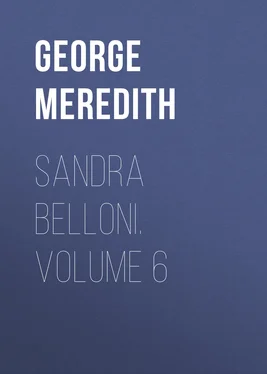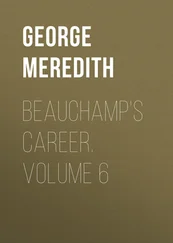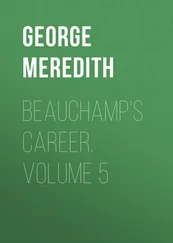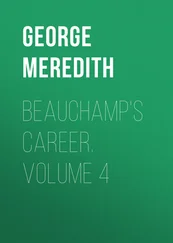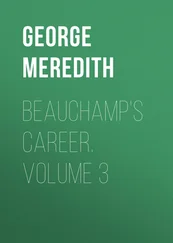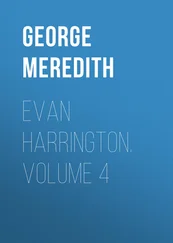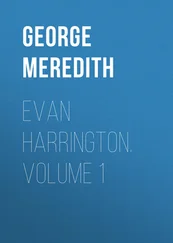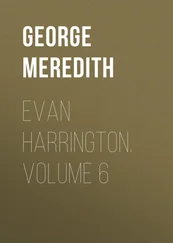George Meredith - Sandra Belloni. Volume 6
Здесь есть возможность читать онлайн «George Meredith - Sandra Belloni. Volume 6» — ознакомительный отрывок электронной книги совершенно бесплатно, а после прочтения отрывка купить полную версию. В некоторых случаях можно слушать аудио, скачать через торрент в формате fb2 и присутствует краткое содержание. Жанр: foreign_prose, literature_19, foreign_antique, на английском языке. Описание произведения, (предисловие) а так же отзывы посетителей доступны на портале библиотеки ЛибКат.
- Название:Sandra Belloni. Volume 6
- Автор:
- Жанр:
- Год:неизвестен
- ISBN:нет данных
- Рейтинг книги:4 / 5. Голосов: 1
-
Избранное:Добавить в избранное
- Отзывы:
-
Ваша оценка:
- 80
- 1
- 2
- 3
- 4
- 5
Sandra Belloni. Volume 6: краткое содержание, описание и аннотация
Предлагаем к чтению аннотацию, описание, краткое содержание или предисловие (зависит от того, что написал сам автор книги «Sandra Belloni. Volume 6»). Если вы не нашли необходимую информацию о книге — напишите в комментариях, мы постараемся отыскать её.
Sandra Belloni. Volume 6 — читать онлайн ознакомительный отрывок
Ниже представлен текст книги, разбитый по страницам. Система сохранения места последней прочитанной страницы, позволяет с удобством читать онлайн бесплатно книгу «Sandra Belloni. Volume 6», без необходимости каждый раз заново искать на чём Вы остановились. Поставьте закладку, и сможете в любой момент перейти на страницу, на которой закончили чтение.
Интервал:
Закладка:
She was to this extent the creature of mania: that she could not conceive of a way being open by which she might return to her father and mother, or any of her friends. It was to her not a matter for her will to decide upon, but simply a black door shut that nothing could displace. When the week, for which term of shelter she had paid, was ended, her hostess spoke upon this point, saying, more to convince Emilia of the necessity for seeking her friends than from any unkindness: "Me and my husband can't go on keepin' you, you know, my dear, however well's our meaning." Emilia drew the woman toward her with both her lands, softly shaking her head. She left the house about noon.
It was now her belief that she had probably no more than another day to live, for she was destitute of money. The thought relieved her from that dreadful fear of the street, and she walked at her own pace, even after dark. The rumble and the rattle of wheels; the cries and grinding noises; the hum of motion and talk; all under the lingering smoky red of a London Winter sunset, were not discord to her animated blood. Her unhunted spirit made a music of them. It was not like the music of other days, nor was the exultation it created at all like happiness: but she at least forgot herself. Voices came in her ear, and hung unheard until long after the speaker had passed. Hunger did not assail her. She was not beset by an animal weakness; and having in her mind no image of death, and with her ties to life cut away;—thus devoid of apprehension or regret, she was what her quick blood made her, for the time. She recognized that, for one near extinction, it was useless to love or to hate: so Wilfrid and Lady Charlotte were spared. Emilia thought of them both with a sort of equanimity; not that any clear thought filled her brain through that delirious night. The intoxicating music raged there at one level depression, never rising any scale, never undulating ever so little, scarcely changing its barbarous monotony of notes. She had no power over it. Her critical judgement would at another moment have shrieked at it. She was moved by it as by a mechanical force.
The South-west wind blew, and the hours of the night were not evil to outcasts. Emilia saw many lying about, getting rest where they might. She hurried her eye pityingly over little children, but the devil that had seized her sprang contempt for the others—older beggars, who appeared to succumb to their fate when they should have lifted their heads up bravely. On she passed from square to market, market to park; and presently her mind shot an arrow of desire for morning, which was nothing less than hunger beginning to stir. "When will the shops open?" She tried to cheat herself by replying that she did not care when, but pangs of torment became too rapid for the counterfeit. Her imagination raised the roof from those great rich houses, and laid bare a brilliancy of dish-covers; and if any sharp gust of air touched the nerve in her nostril, it seemed instantaneously charged with the smell of old dinners. "No," cried Emilia, "I dislike anything but plain food." She quickly gave way, and admitted a craving for dainty morsels. "One lump of sugar!" she subsequently sighed. But neither sugar nor meat approached her.
Her seat was under trees, between a man and a woman who slanted from her with hidden chins. The chilly dry leaves began to waken, and the sky showed its grey. Hunger had become as a leaden ball in Emilia's chest. She could have eaten eagerly still, but she had no ravenous images of food. Nevertheless, she determined to beg for bread at a baker's shop. Coming into the empty streets again, the dread of exposing her solitary wretchedness and the stains of night upon her, kept her back. When she did venture near the baker's shop, her sensation of weariness, want of washing, and general misery, made her feel a contrast to all other women she saw, that robbed her of the necessary effrontery. She preferred to hide her head.
The morning hours went in this conflict. She was between-whiles hungry and desperate, or stricken with shame. Fatigue, bringing the imperious necessity for rest, intervened as a relief. Emilia moaned at the weary length of the light, but when dusk fell and she beheld flame in the lamps, it seemed to be too sudden and she was alarmed. Passive despair had set in. She felt sick, though not weak, and the thought of asking help had gone.
A street urchin, of the true London species, in whom excess of woollen comforter made up for any marked scantiness in the rest of his attire, came trotting the pavement, pouring one of the favourite tunes of his native metropolis through the tube of a penny-whistle, from which it did not issue so disguised but that attentive ears might pronounce it the royal march of the Cannibal Islands. A placarded post beside a lamp met this musician's eye; and, still piping, he bent his knees and read the notification. Emilia thought of the Hillford and Ipley clubmen, the big drum, the speeches, the cheers, and all the wild strength that lay in her that happy morning. She watched the boy piping as if he were reading from a score, and her sense of humour was touched. "You foolish boy!" she said to herself softly. But when, having evidently come to the last printed line, the boy rose and pocketed his penny-whistle, Emilia was nearly laughing. "That's because he cannot turn over the leaf," she said, and stood by the post till long after the boy had disappeared. The slight emotion of fun had restored to her some of her lost human sensations, and she looked about for a place where to indulge them undisturbed. One of the bridges was in sight She yearned for the solitude of the wharf beside it, and hurried to the steps. To descend she had to pass a street-organ and a small figure bent over it. "Sei buon' Italiano?" she said. The answer was a surly "Si." Emilia cried convulsively "Addio!" Her brain had become on a sudden vacant of a thought, and all she knew was that she descended.
CHAPTER XLI
"Sei buon' Italiana?"
Across what chasm did the words come to her?
It seemed but a minutes and again many hours back, that she had asked that question of a little fellow, who, if he had looked up and nodded would have given her great joy, but who kept his face dark from her and with a sullen "Si" extinguished her last feeling of a desire for companionship with life.
"Si," she replied, quite as sullenly, and without looking up.
But when her hand was taken and other words were uttered, she that had crouched there so long between death and life immovable, loving neither, rose possessed of a passion for the darkness and the void, and struggling bitterly with the detaining hand, crying for instant death. No strength was in her to support the fury.
"Merthyr Powys is with you," said her friend, "and will never leave you."
"Will never take me up there?" Emilia pointed to the noisy level above them.
"Listen, and I will tell you how I have found you," replied Merthyr.
"Don't force me to go up."
She spoke from the end of her breath. Merthyr feared that it was more than misery, even madness, afflicting her. He sat on the wharf-bench silent till she was reassured. But at his first words, the eager question came: "You will not force me to go up there?"
"No; we can stay and talk here," said Merthyr. "And this is how I have found you. Do you suppose you have been hidden from us all this time? Perhaps you fancy you do not belong to your friends? Well, I spoke to all of your 'children,' as you used to call them. Do you remember? The day before yesterday two had seen you. You said to one, 'From Savoy or Piedmont?' He said, 'From Savoy;' and you shook your head: 'Not looking on Italy!' you said. This night I roused one of them, and he stretched his finger down the steps, saying that you had gone down there. 'Sei buon' Italiano?" you said. "And that is how I have found you. Sei buon' Italiana?"
Читать дальшеИнтервал:
Закладка:
Похожие книги на «Sandra Belloni. Volume 6»
Представляем Вашему вниманию похожие книги на «Sandra Belloni. Volume 6» списком для выбора. Мы отобрали схожую по названию и смыслу литературу в надежде предоставить читателям больше вариантов отыскать новые, интересные, ещё непрочитанные произведения.
Обсуждение, отзывы о книге «Sandra Belloni. Volume 6» и просто собственные мнения читателей. Оставьте ваши комментарии, напишите, что Вы думаете о произведении, его смысле или главных героях. Укажите что конкретно понравилось, а что нет, и почему Вы так считаете.
